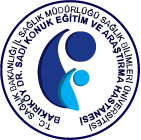ABSTRACT
Conclusion:
Regarding the socio-economical conditions in our country, as in emergency surgery, elective pediatric inguinal hernia should be performed by general surgeons in localisations without pediatric surgeons due to increased risk of incarceration and morbidity and mortality rates.
Results:
Mean age of the patients’ was 6.6 with a male to female ratio of 19/7. All of them had indirect inguinal hernias with 5 case having left sided and remaining 21 cases having right sided inguinal hernia. One case in left sided and 6 cases with right sided hernia had incarceration. High ligation was performed to 21 cases with Nyhus type 1 hernia and Marcy repair was performed to the remaining 5 cases with Nyhus type 2 hernias. Eight of the patients had additional pathologies as 3 undescended testis, one Amyand’s hernia, two hydrocele, one omental incarceration and one umbilical hernia. No morbidity occurred in any of the patients with mean hospital stay as 3 and 1 day in patients with additional pathologies and mere inguinal hernias respectively. Follow up period of six months was uneventful in all patients.
Material and Methods:
Twenty six children (age 2-13) with inguinal hernia were operated between December 2005 and March 2007. Patients were evaluated retrospectively regarding age, gender, localisation of hernias, presence of incarceration and complication.
Objective:
Pediatric inguinal hernia is treated by both pediatric and general surgeons as well as urologic surgeons. There have been few studies documenting the effect of subspecialty training on outcomes after hernia operation in children. The aim of this study is to look for an answer to the question of “should pediatric inguinal hernia be operated by general surgeon’’ and discuss in a scientific field.



